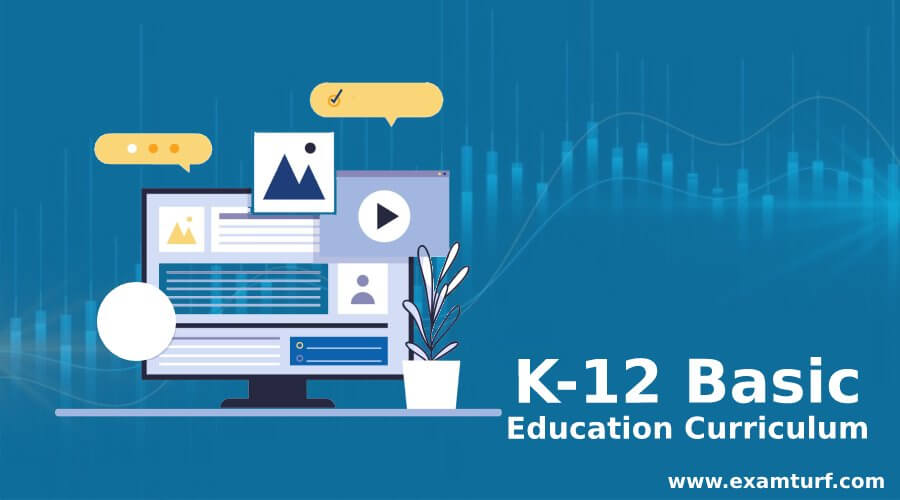
Introduction To K-12 Basic Education Curriculum
The basic curriculum in education refers to statutory subjects which students learn at different levels. K-12 basic education curriculum is designed to shape up the children for their better future life, as best human beings. This includes learning languages, taking knowledge about history, geography, etc., mathematics, understanding science, etc. Apart from academics, non-academic activities are also included in the K-12 curriculum to enhance the skill. Thus, the K-12 education program is the improved modern education method to give the children the best education in all fields so that they can choose their path of interest for their future life.
Key Takeaways
- K-12 education scheme covers all essential basic education curriculum that is required for modern time/society.
- The curriculum is arranged in a way that simple concepts are taught in initial grades and gradually content widens and also in-depth as grades progress.
- The non-academic curriculum is also given importance in K-12 so that students can build their careers in their interesting fields.
- A new curriculum helps the students to enter into global level either for higher education or for employment.
K-12 Curriculum
- K-12 curriculum is designed in such a way that children start learning initially from kindergarten and progress through different levels from grade 1 to 12.
- As the grades progress, the depth in the subjects deepens to get more knowledge and to develop more skills according to their grades.
- The Kindergarten curriculum is arranged for small kids to identify alphabets and numbers, etc., and to socialize with peers in a new school environment, and slowly they are made to adjust schooling for higher standards.
- As the students enter grade 1, simple concepts are introduced and it gradually increases towards more complex concepts as required for the higher grades.
- The K-12 education curriculum is more relevant to students by activities, examples, stories, experiments, illustrations, etc. This makes it the learner easier to understand the subject.
- Importance is also given to skill development and deep knowledge in the K-12 curriculum.
- Discussions and teacher-student interactions are included to enhance information and communication skills.
- As far as languages are considered, along with mother tongue, learning other languages is also encouraged in the K-12 curriculum.
K-12 Curriculum Framework
Given below is the K-12 curriculum framework:
| Grades | Subjects | Description |
| Kindergarten | Alphabets | Identifying and writing alphabets |
| Numbers | Identifying and writing numbers | |
| Rhymes | Poems | |
| Stories | Moral stories | |
| Others | Music, drawing, dance, etc | |
| Primary School (1-7) |
Languages | Mother tongue along with other languages |
| Maths | Basic maths | |
| Science | General science, living and non-living | |
| Social | History, geography, civics | |
| Physical education | Sports and PT | |
| Skill development | Music, dance, drawing, etc | |
| High School (8-10) |
Languages | Mother tongue with other languages |
| Maths | Arithmetic, algebra, geometry | |
| Science | Physics, chemistry, biology | |
| Social | History, geography, economics, civics | |
| Physical education | Sports and PT | |
| Skill development | Communication skills, music, drawing, etc | |
| Pre-University (11th and 12th) |
Languages | Mother tongue with other languages |
| Science | Physics, chemistry, maths, biology, computer science, electronics, etc | |
| Arts | History, geography, sociology, political science, psychology, etc | |
| Commerce | Accountancy, statistics, economics, business studies, etc |
Advantages Of K-12 Curriculum
Given below are the advantages mentioned:
- The enhanced K-12 curriculum off-loads the academic tasks giving more time to develop skills and other opportunities beyond conventional subjects.
- Graduates will acquire knowledge and skills more relevant to current employment demands both in the domestic and international job market.
- K-12 curriculum includes core subjects so that graduates will have the ability to crack the entrance test that is required to go for higher education both in terms of domestic or foreign schools.
- Graduates will get better knowledge and develop skills for self-employment if they opt to run their own business.
- K-12 curriculum helps the students to build their careers in non-academic fields such as music, dance, sports, fine arts, etc.
Recommended Articles
This is a guide to K-12 Basic Education Curriculum. Here we discuss the introduction, K-12 curriculum, framework and advantages respectively. You can also go through our other suggested articles to learn more –
Are you preparing for the entrance exam ?
Join our Exam Preparations test series to get more practice in your preparation
View More